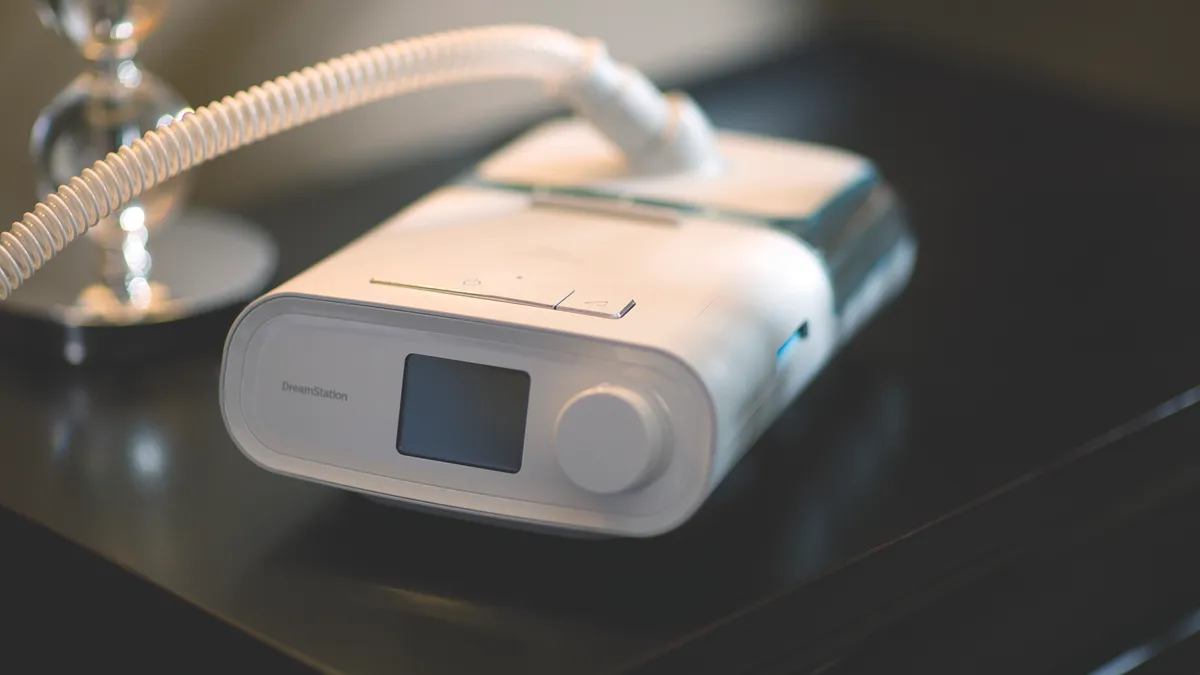Philips’ effort to repair or replace millions of recalled sleep apnea and ventilator machines is being hampered by supply chain constraints, with the company unable to know far in advance when components, particularly computer chips, will be available.
The logistical issues are limiting the number of replacement devices and repair kits the company can produce and ship for the over 5.5 million machines that have been recalled, leaving patients with no idea when replacement machines will arrive.
“We are working hard to overcome serious challenges to device production and delivery, not in the least caused by component and freight capacity shortages in the world,” CEO Frans van Houten said in a video statement released Tuesday. “And while we cannot provide exact delivery dates, we are committed to completing over 90% of the production and shipments to our customers in 2022.”
As of Wednesday, Philips had produced 2.7 million replacement devices and repair kits, and shipped 1.1 million, a Philips spokesperson said in an emailed statement. Shipments began in the second half of 2021.
Roy Jakobs, Philips’ chief business leader of connected care, said in the video that supply chain constraints and logistical problems are only allowing the company to see what supplies are available up to four weeks ahead.
“This not only impacts the speed of production and delivery, but moreover, limits our ability to predict with accuracy when we can deliver to whom,” Jakobs said. “As a result, we can only communicate about when a patient gets a device at best a few weeks before it is delivered.”
Jakobs added that the lack of visibility is not what a patient expects but “it is the best we can do in the current global circumstances.”
Philips began its recall of millions of sleep apnea and ventilator devices last June, after complaints that the foam used to quiet devices could break down and potentially be inhaled or ingested.
The recall affects continuous positive airway pressure machines, bilevel positive airway pressure machines and ventilators. Some of the devices are used to treat sleep apnea, a disorder where breathing repeatedly stops and starts during sleep.
Users could be exposed to toxic chemicals when the foam breaks down. The Food and Drug Administration classified the recall as a Class I event, citing the serious health risks to patients. The agency later published data that showed between April 2021 and April 2022, there were reports of 124 patient deaths and injuries like cancer, pneumonia and asthma associated with the foam breakdown issue.
Since last June, Philips has increased the number of devices affected by the recall to more than 5.5 million, from a range of 3 million to 4 million. The FDA has criticized Philips for failing to properly inform patients, suppliers and distributors that it was recalling the devices.
The company is also facing multiple lawsuits and has been subpoenaed by the U.S. Department of Justice.
Jakobs said in the video that the company is not directly engaging with patients.
“The direct contact is between the patient and his or her physician and home or hospital care providers,” Jakobs said. “This device is produced by a manufacturer, like us, and in most cases, delivered to the patient by a third party … This means that in most cases, the patient is in direct contact with their care providers, the [durable medical equipment supplier], or distributors, and not with the manufacturer of the device.”
The FDA called Philips’ first efforts to publicize the recall “inadequate,” and in March ordered Philips to notify all customers, including patients. Jakobs said Tuesday that Philips is informing “all involved parties” through multiple channels.
Jakobs said that the company usually ships about 1 million of the affected devices a year, so the repair and replacement program requires it to ship five to six times the normal volume. The replacement devices are manufactured in Pennsylvania, Philips said.
As of May 20, Philips has set aside 885 million euros (about $934 million at the time) to address the recall.
The knock-on effects of the global Covid-19 pandemic and the resulting economic slowdown have caused a shortage of semiconductor chips for medical devices, among other products.
ResMed, Philips’ main rival in the sleep market, lowered its revenue forecast for the current fiscal year, which ends in June, saying the recall would add only $200 million to $250 million to its revenue, down from $300 million to $350 million, largely because the chip shortage kept ResMed from increasing its own production.
The chip shortages and other supply chain problems forced Philips to push back the date for when the repair and replacement program will be completed to 2023.


















